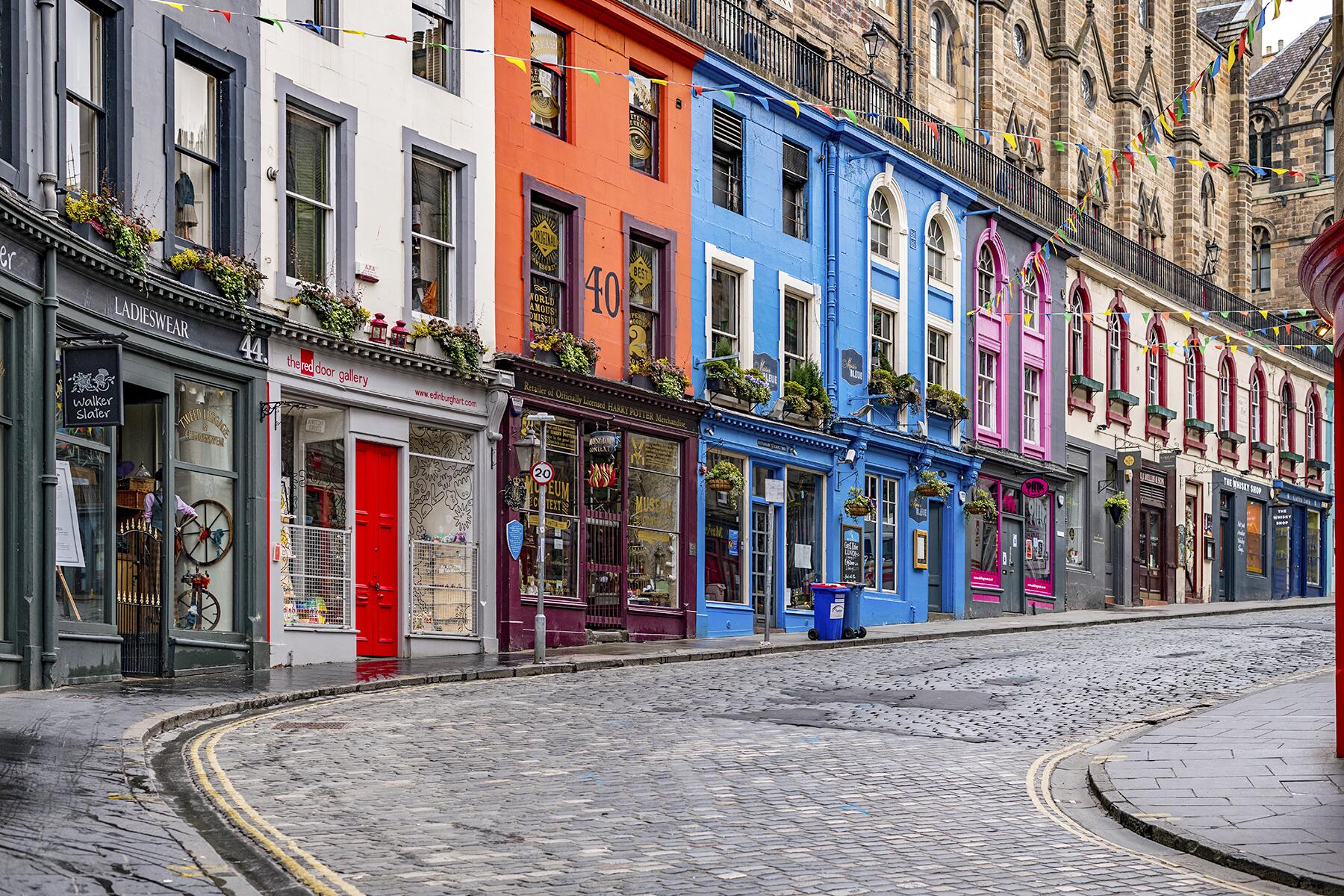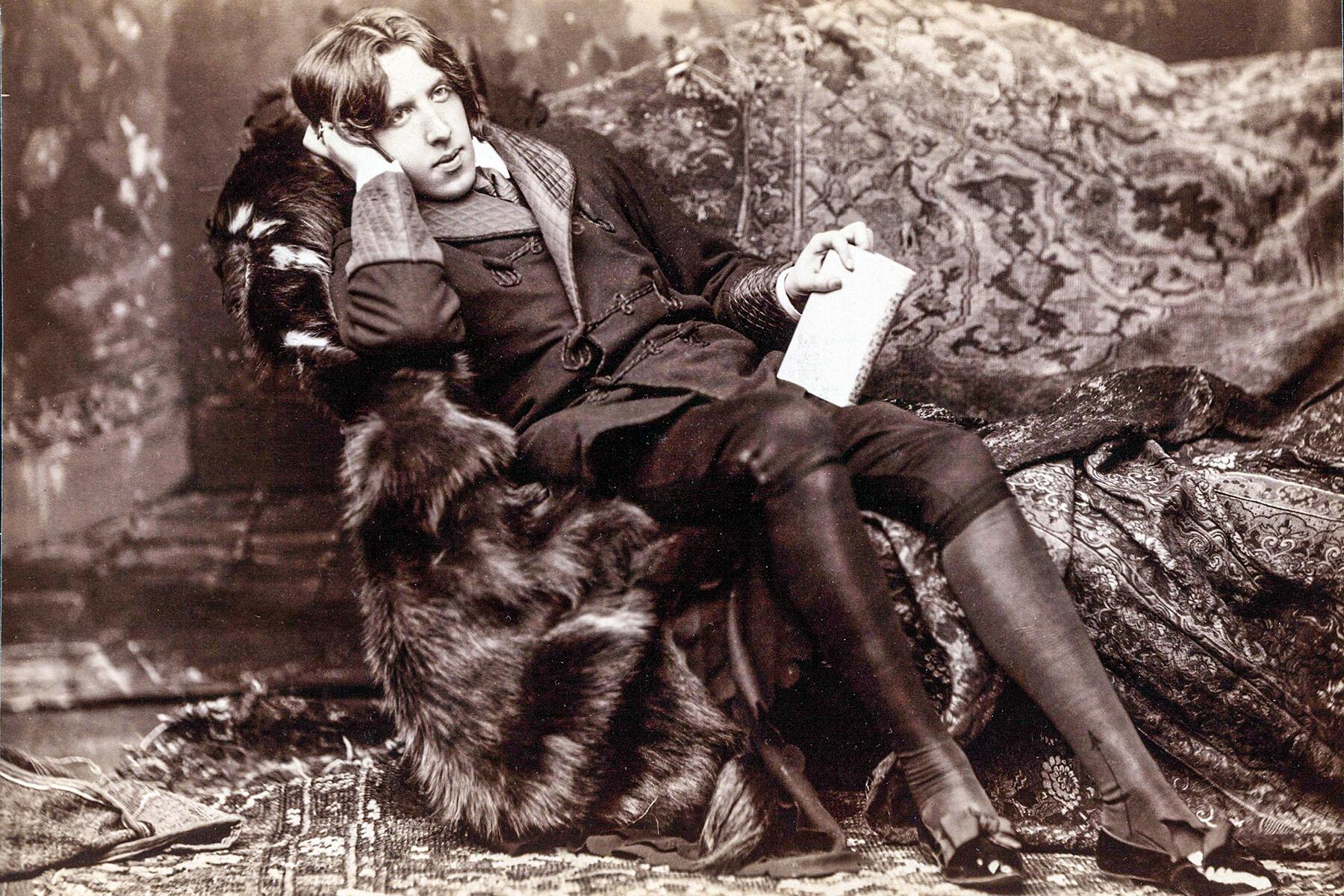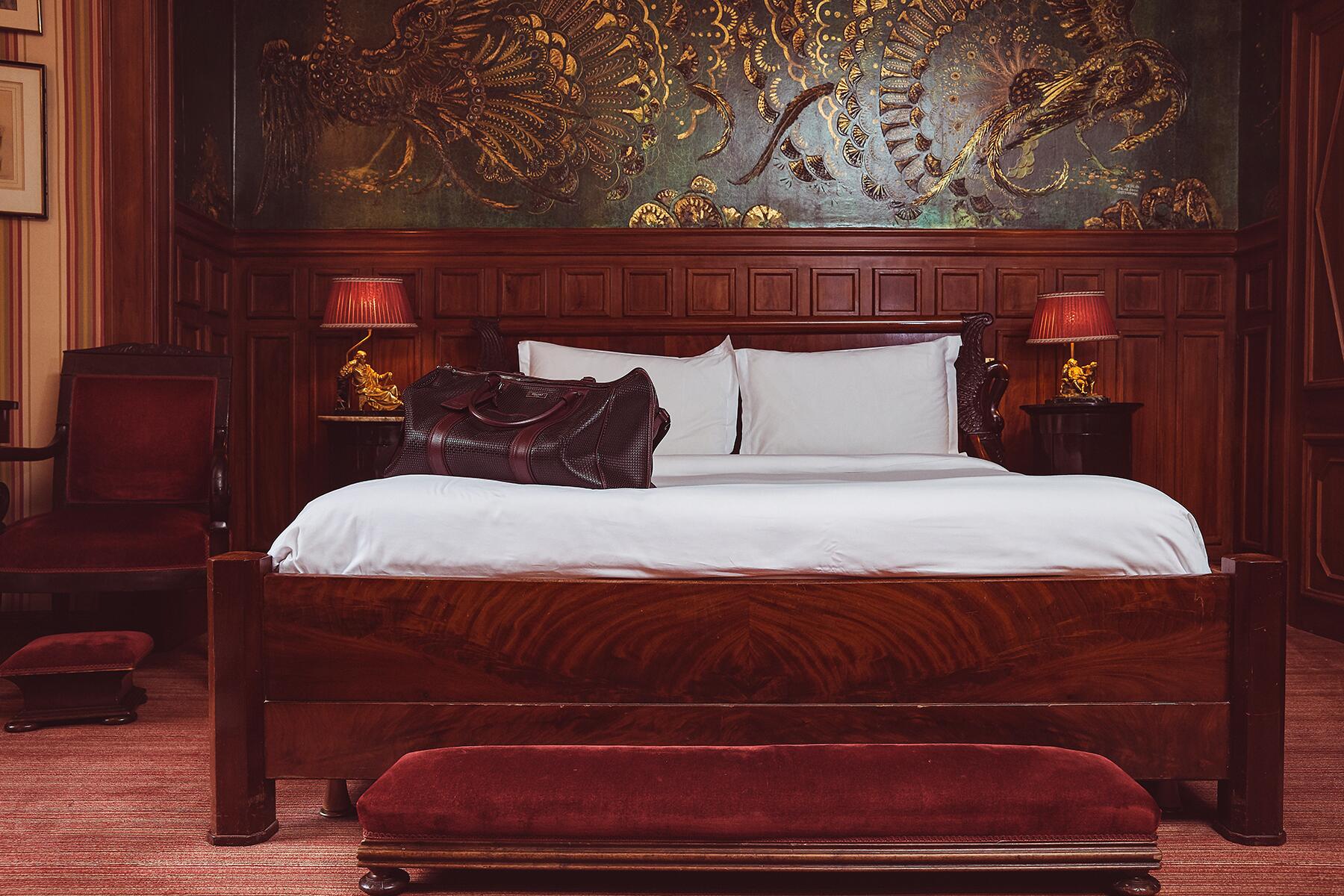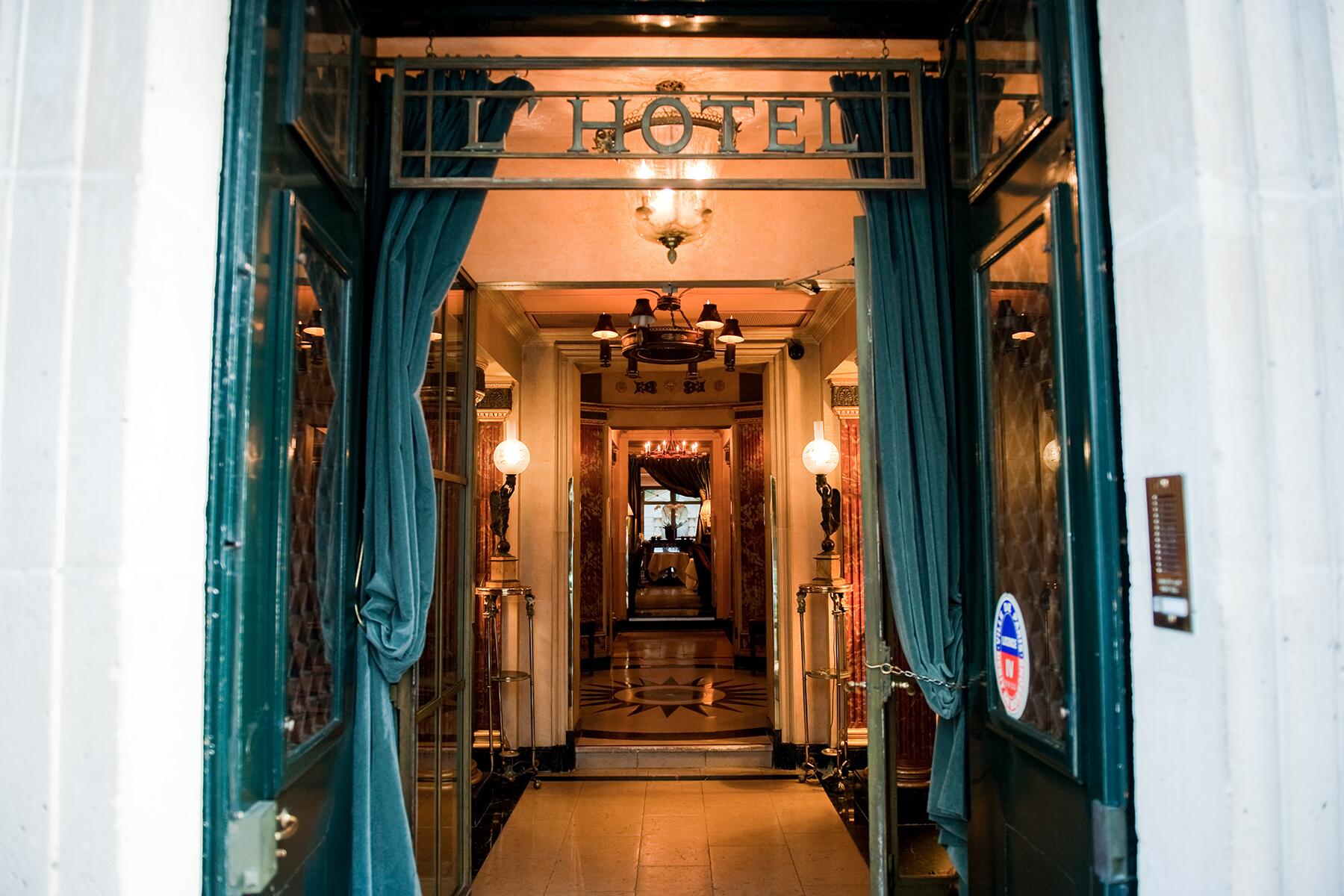Walk in the footsteps of this great writer.
Oscar Wilde died in Paris’s dingy, flea-ridden Hotel d’Alsace on November 30, 1900, at the age of 46, while attended by a loyal friend and a priest. After his passing, it took a healthy dose of liquor and a bribe to convince the coroner to put Wilde’s own name on the death certificate and not his alias—Sebastian Melmoth—under which he was registered at the hotel.
The d’Alsace, located on the Rue des Beaux-Arts, was one of many cheap hotels Wilde lived in over the final 18 months of his life (another was the nearby Hôtel Louvre Marsollier, from which he was evicted for not paying his bill). Even the wallpaper depressed him: “One of us must go,” he quipped shortly before his death.
But much like the writer’s own reputation, the d’Alsace has been restored since the writer’s passing. Now L’Hotel, the former ten-grade hotel, is a five-star boutique establishment, and the room where Wilde died has been reimagined with period furniture and designed after his own London apartment. The room pays homage to Wilde with paintings, caricatures, and a framed copy of his final bill.
During a massive renovation to the hotel 100 years after the writer’s death, the offensive wall covering was replaced by green and gold paper featuring an ostentatious peacock design. No longer a hotel for the destitute, lucky guests in the Oscar Wilde suite will pay between 800 and 1,000 euro per night for an experience that feels lavish and decadent rather than macabre. And the hotel’s Michelin star restaurant is a vast improvement over the boiled pork chop Wilde dined on daily.
Recommended Fodor’s Video
The hotel is one of many of Wilde’s former haunts that can still be visited today, but retracing his footsteps through the city can be a bittersweet experience. For Wilde, there were two versions of Paris: The one that showered him with praise as he rose to literary stardom, embracing him for his talent, wit, and conversation, and the one in which he experienced personal and artistic collapse under self-imposed exile following an inhumane and hard-labor sentence in a London prison.
Wilde’s Favorite Haunts in Paris, the Literary Capital
Paris inspired Wilde from his first visit in 1874 when the then 20-year-old visited the city with his beloved mother. To him, Paris was the “literary capital of the world.” Between 1883 and 1884, he spent several months at the Hotel Voltaire on the Rive Gauche (now the Hotel Quai Voltaire), accepting invitations to literary salons, dinner parties, and gallery openings. He met the likes of Edgar Degas and Emile Zola and an aging Victor Hugo—who is said to have nodded off during the encounter.
Ambitious and confident that he should be accomplished as a playwright, Wilde wrote two plays during this time, declaring to a family friend: “I am determined that the world shall understand me.”
Neither play was successful, but the city had captured him. He even transformed his appearance, adopting a new hairstyle based on a statue of Nero he’d admired at the Louvre, and he began carrying a statement ivory cane.
Wilde honeymooned in Paris in 1884, settling into high society London life and becoming a father to two sons. He did not return to Paris until 1891, arriving just before the publication of his novel, The Picture of Dorian Gray, which he hoped would establish him properly in the Parisian literary scene.
He spent several weeks hobnobbing with artists and immersing himself fully in the café culture, with several favorite haunts that are still operating today, such as the Grand Café Capucines near the Opera house and Café du Flore and Les Deux Magots on the Boulevard St Germain. He also enjoyed the fashionable (at the time) cabaret fanfare of the Moulin Rouge.
Wilde found himself in Paris again several months later and rented a room on the Boulevard des Capucines. One evening, according to his version of events, he shared with a group of young writers the story of Salomé, impressing them with his storytelling and command of French. It became his first play written in the language and a point of great pride for the writer, who was eager to be accepted fully into the French literature fold.
In the English language, Wilde’s star continued to rise as a playwright, with strings of successes such as Lady Windermere’s Fan (1892), A Woman of No Importance (1893), and An Ideal Husband (1894). Before his prison term, his plays alone brought him today’s equivalent of 1 million pounds. But his abrupt downfall began on Valentine’s Day, 1895 when The Importance of Being Earnest premiered in London.
That evening, Wilde was delivered the card of the Marquess of Queensberry, on which he’d written: “For Oscar Wilde posing somdomite [sic].” It prompted Wilde’s disastrous libel suit against the Marquess, which landed Wilde in a London jail for homosexual acts, illegal at the time. The conviction cost him his wife, children, many friends, wealth, and reputation.

Wilde’s Rehabilitation Through Art
Post-prison, Wilde hoped to restore his place as a respected writer. “The gods had given me almost everything,” Wilde wrote from Reading jail in De Profundis. “I had genius, a distinguished name, high social position, brilliancy, intellectual daring.” He was, post-prison, committed to “asserting myself as an artist as soon as I possibly can.”
On his release, facing poverty, uncertainty, and isolation, Wilde intended to build a quiet life in Berneval-le-Grand in Normandy. There, he wrote “The Ballad of Reading Gaol,” a poem that describes the brutality of the Victorian prison system, including the treatment of child prisoners, and would help bring reforms to the English criminal justice system.
The poem was published in February 1898 under the name C.3.3., which was Wilde’s prison cell number, as his name was deemed too notorious to grace the cover. (It was not until the seventh edition the following year that the actual author was listed.)
With this new work complete, Wilde could not help but be called back to “the abode of all artists.” On its publication date, he returned to Paris in hope of rebuilding his literary standing and receiving the warm welcome of his friends.
He had reason to be optimistic: The city had always been an ally to his work. The French praised his novel The Picture of Dorian Gray even as the British used it against him in his trial. The French translation was published during his imprisonment, and his play Salomé, banned by English censors, was performed in Paris’ Théâtre de la Comédie-Parisienne (now Théâtre de l’Athénée) during the same period—the only performance given during his lifetime.
He arrived in the city and set up in the Hôtel de Nice on the Rue des Beaux-Arts. He spoke of writing a new play. He arranged for the publication of The Importance of Being Earnest and An Ideal Husband, making enormous revisions to the former in particular, but when these failed to stir any interest, Wilde was eviscerated. Although “Reading Gaol” sold very well and was even translated into French, it became clear that Wilde would never recover what he’d lost. He never wrote again.
Wilde’s Final Days and Restored Glory
The Paris of Wilde’s final years starkly contrasted with his pre-prison glory days. Having given up all pretenses of producing new work, he availed of the personal and sexual freedom the city permitted him. He unapologetically threw himself into his vices: absinthe and sexual companionship with so-called “rent boys.”
Despite his many losses, Wilde still found pleasures to occupy his mind. He was particularly fascinated by the 1900 Paris Exhibition, where he was a frequent visitor. But depression and loneliness plagued him. He dreaded being alone. He was occasionally treated to dinners at the likes of Café de la Paix, but mostly he spent his time at a trendy coffee house, Calisaya, talking to anyone who would listen.
Following his death, Wilde was initially buried in a pauper’s grave at the Bagneux cemetery following a thinly attended funeral at Paris’ oldest church, the Église Saint-Germain-des-Prés, before being removed nine years later to the more fitting Père Lachaise, among other notable figures including Edit Piaf, Sarah Bernhardt, and Gertrude Stein. In 2017, along with 75,000 other gay men, Oscar Wilde was posthumously pardoned.






